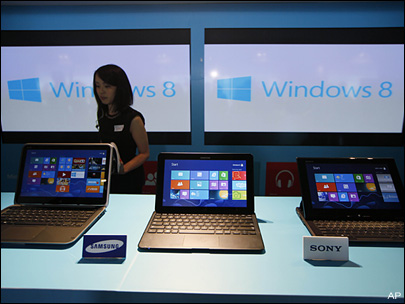 NEWS
NEWS
 NEWS
NEWS
 NEWS
NEWS
![]() The poor old PC is suffering from a terminal decline, with the chances of it making a recovery looking slimmer by the minute as a new generation of mobile tablet devices drastically alters the technology landscape. As if to illustrate that point, research firm IDC has just published its latest quarterly report, showing that the PC market has slumped by a colossal 13.9% over the last quarter, making it the worst sales drop in history.
The poor old PC is suffering from a terminal decline, with the chances of it making a recovery looking slimmer by the minute as a new generation of mobile tablet devices drastically alters the technology landscape. As if to illustrate that point, research firm IDC has just published its latest quarterly report, showing that the PC market has slumped by a colossal 13.9% over the last quarter, making it the worst sales drop in history.
As if to emphasize just how bad a slump that is, IDC says the rate of decline is almost double what it predicted for the first quarter of this year.
Things shouldn’t have been this way. With the launch of a revamped Windows operating system and the shelves stacked full of sleek, touchscreen machines running it, this was meant to be an exciting new era for the PC. But rather than halt sliding sales as Microsoft had hoped, if anything Windows 8 has helped to accelerate that decline, as negative reviews of the operating system deter consumers from giving it a try. Today’s report means that PC shipments have fallen for consecutive year-on-year declines.
Even worse for the PC is that the challenges facing it have become even more acute, as the range of tablet computers and smartphones continues to swell. These devices may not offer the same processing power and capabilities as the PC, but nevertheless the vast majority of consumers seem to prefer these newer technologies, what with their greater mobility and more affordable prices.
This is the environment that Windows 8 stepped into upon its release last year. Microsoft boldly revamped its flagship OS, tailoring it to run on a new generation of “hybrid” ultrabooks as well as traditional desktops. But the changes that Microsoft made, particularly its new “Metro” environment for the mobile side of things, have largely failed to win over consumers, while many more have been scared off by the deluge of negative reviews in the media.
Bob O’Donnell, program vice president for clients and displays at IDC, sums things up for Microsoft with his comments:
“At this point, unfortunately, it seems clear that the Windows 8 launch not only failed to provide a positive boost to the PC market, but appears to have slowed the market. While some consumers appreciate the new form factors and touch capabilities of Windows 8, the radical changes to the UI, removal of the familiar Start button, and the costs associated with touch have made PCs a less attractive alternative to dedicated tablets and other competitive devices. Microsoft will have to make some very tough decisions moving forward if it wants to help reinvigorate the PC market.”
What we’re seeing is further proof of Steve Job’s prediction back in 2011 of a “post-PC era” in which smartphones and tablets become the device of choice for the vast majority of their computing needs. This much is undoubtedly true for consumers, but we’ve yet to see the full implications of this trend in the enterprise. iPads and Android tablets have certainly made their presence felt, but the PC’s biggest saving grace for now is that it remains the only platform capable of doing real work in a business sense.
But as tablets continue to evolve and the culture of BYOD grows even stronger, even this last bastion may not be safe from attack.
Support our mission to keep content open and free by engaging with theCUBE community. Join theCUBE’s Alumni Trust Network, where technology leaders connect, share intelligence and create opportunities.
Founded by tech visionaries John Furrier and Dave Vellante, SiliconANGLE Media has built a dynamic ecosystem of industry-leading digital media brands that reach 15+ million elite tech professionals. Our new proprietary theCUBE AI Video Cloud is breaking ground in audience interaction, leveraging theCUBEai.com neural network to help technology companies make data-driven decisions and stay at the forefront of industry conversations.